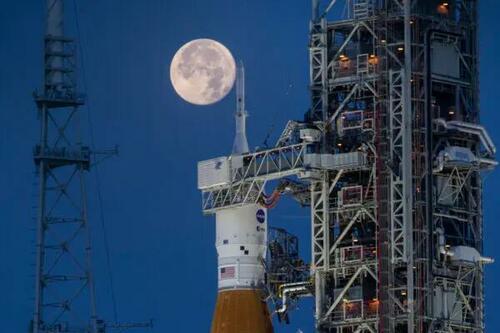Authored by Katabella Roberts via The Epoch Times (emphasis ours),
NASA’s Office of Inspector General (OIG) has expressed concerns regarding quality control and standards at Boeing, the plane maker, and its involvement in assisting the space agency in sending astronauts back to the Moon.
A report released by NASA’s OIG on Aug. 8 focuses on the Space Launch System (SLS) version 1B. This powerful heavy-lift rocket system is intended to be used by NASA to transport the crewed Orion spacecraft and large cargo to the Moon in 2028 as part of the Artemis IV mission.
The report highlights that a crucial aspect of this upgrade is Boeing’s development of the SLS’s new upper stage, known as the Exploration Upper Stage (EUS), which will play a significant role in the Orion mission.
Upon completion, the EUS will enhance the SLS’s carrying capacity by 40 percent, increasing from 27 metric tons under Block 1 to 38 metric tons with Block 1B, as indicated in the report.
However, the progress on the SLS, which has been under development since 2014, has been plagued by various issues, including Boeing’s ineffective quality management and inexperienced workforce, along with ongoing cost escalations and schedule delays, according to the report.
As part of the investigation, NASA’s OIG conducted interviews with officials at NASA Headquarters, Marshall Space Flight Center, Boeing, and DCMA between August 2023 and May 2024.
Additionally, a visit was made to the Michoud Assembly Facility in New Orleans, Louisiana, to oversee the SLS core stage and EUS production.
The OIG discovered that Boeing’s quality management system at Michoud does not comply with international standards set by the global association SAE International.
The report highlighted 71 “Corrective Action Requests” (CARs) issued by the Defense Contract Management Agency (DCMA) at Michoud between 2021 and 2023 to rectify quality deficiencies.
NASA’s OIG emphasized that this is a “high number of CARs for a space flight system at this stage in development and indicates a recurring and deteriorating state of product quality control.”
“Boeing’s process to address deficiencies to date has been ineffective, and the company has generally been nonresponsive in taking corrective actions when the same quality control issues reoccur,” the report stated.
‘Foreign Object Debris’ Found in Fuel Tank
The report also pointed out issues such as “foreign object debris” discovered inside the SLS Core Stage 2 liquid hydrogen fuel tank.
The debris consisted of “metal shavings, Teflon, and other debris on and underneath the entry platform and ladder assembly on the forward dome panels inside the tank.”
“Foreign object debris can damage hardware and potentially injure flight crew when entrapped within crewed flight articles,” the report noted.
The liquid hydrogen fuel tank was subsequently cleaned, reinspected, and found to meet standards, according to the report.
During a visit to Michoud in April 2023, the OIG observed substandard welding on a liquid oxygen fuel tank dome, a critical component of the SLS Core Stage 3.
The report also mentioned that Boeing officials erroneously approved hardware processing under unacceptable environmental conditions on another occasion.
“Quality control issues at Michoud are largely attributed to the insufficient number of trained and experienced aerospace workers at Boeing,” the report stated.
To address these challenges, Boeing provides training and work orders to its employees, although the OIG found these efforts to be inadequate considering the significant quality control deficiencies at Michoud.

Rising Costs
The EUS contract for Boeing has seen a significant increase from the initial cost of $962 million in 2017 to over $2 billion by 2025. Additionally, the delivery of the EUS to NASA has been delayed by six years, from the original target date of February 2021 set in 2016 to April 2027, according to the report.
“Given Boeing’s quality management and its related workforce challenges, we are concerned these factors could potentially impact the safety of the SLS and Orion spacecraft including its crew and cargo,” the report concluded.
The OIG report made several recommendations, including that Boeing collaborate with the Associate Administrator for Exploration Systems Development Mission Directorate (ESDMD) to create a quality management system training program that complies with international standards.
It was noted in the report that NASA officials would review the program.
Furthermore, the report suggested imposing financial penalties on Boeing for “noncompliance with quality control standards,” although NASA ultimately decided against penalizing the company.
The Epoch Times has reached out to Boeing for comment.
Stuck in Space
The report coincides with NASA astronauts Butch Wilmore and Suni Williams being stranded in space aboard the Boeing Starliner due to ongoing issues with its thrusters.
During a press conference earlier this week, NASA mentioned that they are contemplating bringing the two astronauts back on SpaceX’s Crew-9 mission in February 2025.
Wilmore and Williams launched on June 5 from Cape Canaveral Space Force Station in Florida and docked with the ISS on June 6. Their original return date was set for June 14, around one week after their launch.
Loading…

